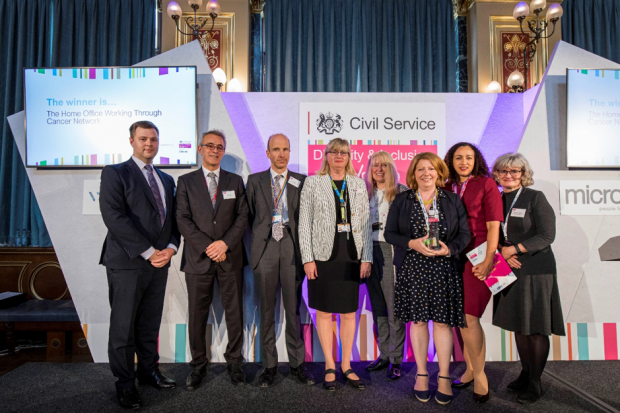To mark this year’s International Day of People with Disabilities (3 December), Ben Merrick, Deputy Civil Service Disability Champion, reflects on developments in support for civil servants with a disability over the last 12 months.

My day job, as Director for the Overseas Territories in the Foreign and Commonwealth Office, remains extremely busy. It has included Brexit preparations, ensuring the UK was ready to support our Overseas Territories and the independent Caribbean during hurricane season, and continuing to oversee our stewardship of the British Antarctic Territory and British Indian Ocean Territory. Throughout this, I sought to build on the points in my previous blogs, about getting the greatest benefit from my disability by leading through others, stepping back to focus on the big issues, and role-modelling resilience.
My role as Deputy Disability Champion
I was particularly honoured to be asked to be Deputy Disability Champion for the Civil Service, in addition to my role as Champion for Civil Service Visual Network. Sir Philip Rutnam has been doing great work as the Disability Champion, supported by the Cabinet Office disability team, and it’s a real pleasure to join forces with them.
The champion role is partly about communicating the importance of the agenda, both inside and outside the Civil Service. The most enjoyable event I’ve taken part in was theCivil Service Diversity & Inclusion Awards, where I presented the prize for Championing Disability Inclusion to the hugely deserving Home Office Working through Cancer Network.
The role is also about understanding the issues and what actions will have the greatest benefit. We need good data and evidence, and because there are more than 400,000 civil servants across 455 organisations (as of 31 March 2019), we have a great deal to work with. The Civil Service aspires to be the most inclusive employer in the UK by 2020 and we’re making good progress.
To understand how we’re doing and what more needs to be done, it’s really important that all civil servants, disabled or not, record their disability status. The Civil Service has a 72% recording rate, which we want to raise so as to give us the best picture of progress, what more we need to do and where. The proportion of civil servants with a disability is 11.7% - lower than the 13.4% of the UK working-age population registered as disabled. The Scottish Government currently has the highest percentage of disabled members, with 16.1%.
There is obviously more to do, particularly as the percentages of staff who are disabled generally decrease among the more senior grades. Sir Philipset out his 6 priorities and asked me to focus on supporting line managers of disabled people, and the parts of government that make up the National Security community, who have asked me to act as their disability champion. Working with high-security classification can create practical problems for those with disabilities, and creating a diverse and inclusive culture is vital for our approach to national security.
My aim is to ensure that as much information and advice as possible is shared with people with disabilities, their line managers, and other colleagues who want to support them. Fortunately, I’ve also been asked to sponsor a group of disability network chairs as part of thePurple Space bursary scheme, which is aimed at maximising the power of networks. This group is scoping out how we can set up a central information hub for exactly this purpose. Clearly, there’s a lot of advice and support out there, of which the Civil Service Workplace Adjustments Service is an important part. But, as in every walk of life, I often hear people say, “if only I knew where to turn”. Not every problem can be solved, but I hope that the combination of information on physical adjustments, assistive technology, easy tweaks to ways of working, and advice on optimising your disability will be really useful. We’ll put out more information on that in due course, though if you have ideas on content, please email me at Ben.Merrick@fco.gov.uk.

Developing disabled talent
This year we have placed great emphasis on developing disabled talent through formal leadership schemes, as well as encouraging mentoring and other support, through initiatives such asFLS Delta,REACH and a new Senior Disability Network. I am fortunate to have some really inspiring and enthusiastic mentees, and I benefit enormously from the mentoring relationship myself. Overall, given the breadth of the agenda and the size of the Civil Service, I’m keen to see where I can have the greatest effect, so would welcome any suggestions.
One thing that has really struck a chord with me is the sense that more and more people with non-visible disabilities are talking openly about them for the first time. Although I’m legally blind, as I have no central vision, I do retain peripheral vision, so can get around without others necessarily being aware of my disability, even though I can’t recognise anyone’s faces. When I first lost my sight, many years ago, I felt a slight – and entirely irrational – shame about my disability. That, probably combined with the fact that I couldn’t be bothered to talk about it, meant I would disguise it by asking people a series of open questions in the hope that I could work out who they were without letting on. After being caught out at a party after spending 20 minutes pretending I knew who someone was, I realised I needed to get over myself and just be upfront about it. I’ve never looked back. Colleagues say that my openness has encouraged them to open up about their disability, which in turn has enabled more junior staff to do likewise. I’m keen that as many people as possible normalise this sort of approach.
So, another busy and fulfilling year. I look forward to all of us going yet further in 2020.

2 comments
Comment by Gavin Thomas posted on
Thank you Ben for this useful reflection. I have to say that during my 28+ years with the FCO, I have been encouraged with the great work that the FCO Staff Association ENABLE have been doing to ensure that staff are treated with respect and equality and can feel that they working in an inclusive environment.
I must also commend the fantastic work that Sir Philip and you in your Deputy Champion role have been doing to increase awareness and understanding within the Senior Management cadre and in particular to make them more Disability Confident Leaders.
As an Advocate of Wellbeing, it is great that it has been acknowledged that not all disabilities are visible and in particular Mental Health.
Comment by Harjinder Jutle posted on
We need a champion for the OTs themselves. Next time you are here or I am there, we should meet up - Harjinder Jutle, Head of Procurement, Government of Montserrat, and President of Montserrat Association for Persons with Disabilities.